MALAYSIANSKINI If you ask the state who Hishamuddin Rais is, the answer is a laundry list of anti-government actions spanning five decades.
The authorities can point to the student rallies he helped organise, aligning those attending lectures at universities with peasant uprisings of the 1970s.
During the Reformasi period in the late 1990s, former prime minister Dr Mahathir Mohamad pinned on the firebrand’s lapel the notorious label of “dalang reformasi” (mastermind of Reformasi, the period of political tumult), earning him stints at lock-ups in Dang Wangi, Pulapol and Jalan Stadium.
Today, the 65-year-old is a “seditionist” for calling for the toppling of the newly-elected government in 2013. If his final appeal in the court today fails, he will be spending nine months behind bars.
Hishamuddin is no stranger to life in detention. He has been been detained eight times in Malaysia - the longest being a 26-month stay as a political prisoner at Kamunting Detention Centre, from 2001-2003, twice in India, once in Russia and once in Australia.
But who is Hishamuddin Rais?
Ask those from Universiti Bangsar Utama (UBU), a collective he founded in the late 1990s to instigate youth to take up political action, and they will call him their own Che Guevara, a big brother figure for youths whose coming of age was during a volatile political period in Malaysia’s history.
Ask others still and they will speak of his food column, his excellent dishes and even his foray into food styling for a photo shoot for ‘The Last Supper’.
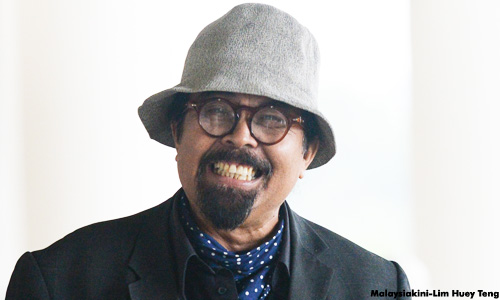
Others will recall his television scripts - uncredited due to the controversy it could bring - for TV dramas and comedies. Among them was ‘Mencari Anak Wayang’, which ran for 123 episodes.
He has written songs and at least one play - ‘Bilik Sulit’ - which was first featured in Malaysia in 2005, then in 2008 and 2013 it and closed in London after a month-long tour in the UK in April 2014.
More recently, Hishamuddin has also done stand-up comedy, all to spread the message that Malaysia needs democracy, plain and simple. But this message is not always well-received.
“(Even today) I can say that at certain venues, I can’t perform as a stand-up comedian. Apparently, Hishamuddin can’t be involved. My political comedy is seen as offensive, subversive and a danger to the club,” he said in an interview with Malaysiakini recently.
Having lived in self-imposed exile for 12 years, he has picked up some European habits - he wears cravats and an assortment of hats, appearing in a television show in 1994 in a beret, with fat prayer beads in his hands to make a political point.
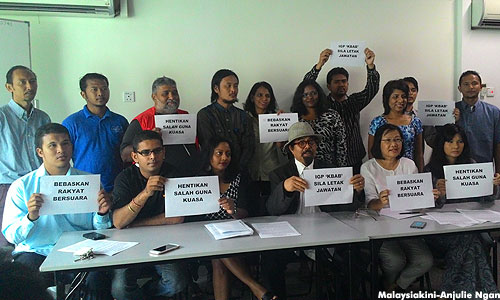
He braves Malaysia’s blazing heat in a blazer, but his reasons are practical - he needs pockets for all the keys he carries around.
The eccentricity and his court jester ways make the former Bersih steering committee member a crowd-puller at ceramah sessions, cracking jokes and making the makcik and pakcik giggle through his spot-on socio-political commentaries.
It is debatable whether he coined the term ‘NGI’ (non-governmental individual), as opposed to NGOs (non-governmental organisations) but among those critical of the government, he is a veritable institution.
Of all the things he does well, there are many things he does not, or cannot do. This includes driving.
Despite lacking a driver’s licence, his feature film ‘Dari Jemapoh ke Manchestee’ is a coming of age road trip movie, featuring a classic red Volvo and features landscapes of his native Negri Sembilan. He has also acted twice in TV dramas, ironically, as taxi drivers - the car, dragged on the road by another vehicle to simulate driving.
An old school kind of guy, the Kuala Pilah-born and Jelebu-raised Hishamuddin does not know how to click ‘like’ on Facebook. Despite earning some income from his popular blog ‘Tukar Tiub’, with the 20,000-plus Twitter followers, he holds a critique of “technology” and social media and how humans use these communications platforms.
Just as well, as he does not keep to well-defined boundaries, often found politically incorrect and at times taken to task for sexist remarks.
Ever reflective, he says that he recognises “traits of masculinity, sexism, and patriarchy” in him, and would not mind attending a gender awareness training session “after Kajang”, where he could be serving the sedition sentence, if the conviction is upheld.
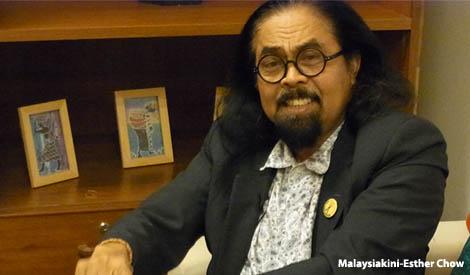
But the occasional faux pas is not enough to turn off fellow activists who are lining up to care for his many pets if he is sent away.
One would think a man with such a legion of fans would have, by now, put together an autobiography. In Hishamuddin’s head, the biography will be three-parts, but for now, it will remain in his mind.
“One doesn’t write a biography about oneself until you get a heart attack. My health is okay.
“When you write something, it’s almost as if you are coming to an end. I’m not. I am still at my prime. The nation will have to bear with me for a few more years."
Here is his story, in his own words.
I WAS A PROBLEM CHILD for my parents. Once, before I was of schooling age, I went with my parents to visit a newborn. I looked at the head - the skull was still forming - and I could see the ubun (crown) moving and I touched it (and gave everyone a fright).
Every time before we visit anybody, my mum would say: “Jangan cakap ini, jangan buat tu” (Don’t say this, don’t do that).
IT WAS NOT A BAD CHILDHOOD. The whole ricefield was my playground, the river was my swimming pool, the jungle behind my house was my hunting ground. I had, as (English writer) EM Forster said, “a well-developed heart, a well-developed character”.
I DEVELOPED A REPUTATION. Some parents used me as a tauladan (an example), some as sempadan (a limit).
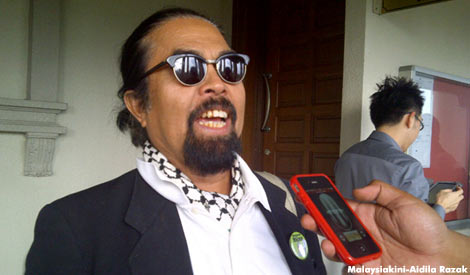
I remember being on the same panel as the now mufti of Perlis (Asri Zainul Abidin) in Shah Alam four or five years ago. (He said) when he was in UIA (International Islamic University), he was a rebel and the VC asked him, ‘You want to be Hishamuddin, ke?’. I have also met a Malaysian artist in Paris. She told me her father said, ‘Don’t be like Hishamuddin’.
I DON’T HAVE A SMARTPHONE ‘COS I DON’T ALLOW ANYTHING I OWN TO BE SMARTER THAN ME. I don’t have WhatsApp. I have Facebook but I don’t even know how to click ‘like’. I have never clicked ‘like’.
In Europe, at least in Belgium, on the weekends, there are no newspapers. In London, the news is shorter on weekends; it’s as if nothing happened. After 7.30pm, the world slows down.
I don’t own a laptop. I have a tablet. When I go out of KL, I use it as my desktop. I read (about) a research (finding) recently that people who communicate using these things less are more sober, less assaulted by, the German word, angst.
THESE MODES OF COMMUNICATION ARE ALL OVER THE TOP. For example, you have dinner with two or three friends and they are constantly on their mobile phone. Come on. Pay full attention to the food on the table. This is my criticism and one of my obsessions.
TV IS BAD ENOUGH. (On TV), you go for soundbites. With Twitter, in these 140 characters, in that short form, you minimise spelling, minimise the idea. We communicate less and in a less human way.
I use Twitter and Facebook to publicise events; that’s all. I rarely, rarely respond. I don’t know if I have liked anything. I don’t follow anybody.
I have about 20,000 followers, kot (maybe)? I put it (my post) there, I retweet public forums, events, some gigs, mostly political ceramah.
I tweet from my desktop. After 7.30pm, I stop my tweets.
The thing about humans is their ability to communicate in using language; it can be very beautiful.
I AM NOT AGAINST TECHNOLOGY. I am not raging against the machine, but I have more confidence in the ability of the human person to communicate using his oral ability, his brain, not (mediated) by technology.
I object to WhatsApp (being used to discuss important decisions). it has created problems - people say something and it gets shared.
The difference (between communicating using these platforms and) talking with someone in front of you is that there is body movement; you can look at the face, gesture.
When in front of a machine, you can’t see what people on the other side are doing. If machines take over, humanity has diminished in its value.
The best thing technology has offered me is the washing machine - I was liberated from washing my dirty clothes.
I DO stand-up comedy, theatre, my plays, my films, songs that I write - these are just mediums. People get confused.
I am still sending the same message. The medium changes from time to time. Sometimes the medium overlaps with one another, but the text hasn’t changed. The text is that we still need to have plain democracy in Malaysia. That’s it.
MALAY IS NOT BIOLOGICAL; it’s a social construct. It’s also a sense of being. And there’s also another modern form – Melayu kad pengenalan (identity card Malay) – constitutional Malay.
For me, being Malay is a sense of being, an attachment to a geographical area, to a culture, cultural norms and beliefs in the general sense.
It’s like in Britain, there’s King Arthur, Excalibur, Camelot - the myths. Same with my Melayu. I play Hang Tuah and Hang Jebat.
Whether they exist or not, it doesn’t matter. I identify as a Malay in that sense, not above or below anybody; just my sense of being.
BEING MALAY IS ALSO IN THE FOOD. Malay food is excellent. The taste is there, well-developed, with spices. It’s peasant food.
The presentation is a bit of a failure; it hasn’t come to the state of being a cuisine, it’s just dishes. In Malay you say, hanya makanan, belum jadi santapan.
The ratio of kuah (gravy) and ikan (fish), for example. Those days, we were poor (and ate the sauce with a lot of rice). We must learn to make less sauce.
I HAVE NEVER IMAGINED MYSELF OWNING A CAR, never had the desire to own a car. If I were to own a car, it would be this French car called (Citroen) 2CV – like (Perodua) Kancil, it’s small; they don’t make them anymore.
The Kancil or 2CV, they’re elegant because they are small. In a big city, it’s easy parking. I don’t know about the engine; I am looking only at the flexibility of the vehicle.
PEOPLE SAY I LIVE POORLY. I live better than the New Yorker yuppie. People have no base; I have a base. My base is the Indian jail (in 1982) – a crowded small place with a toilet with dry shit in it. It’s in the basement, with the suffocating smell of urine and shit.
Whenever I am done, I compare it to the Bombay Central lock-up and Arthur Road. (In recent times, Bollywood actor) Salman Khan was there too. I don’t know his block; I was in Block 3. Ya, that was where I was.
I shared the same lawyer as (‘Bandit Queen’) Phoolan Devi. Before Indarjit Singh defended Phoolan Devi, she defended me. She is a competent, female human rights lawyer appointed by the NGO which supported me (during my incarceration in India).
PEOPLE WHO SAY I AM SEXIST AND ‘MASCULINE’ are probably right. I have traits of masculinity, sexism, and patriarchy. I have not developed into a full-blown feminist. I’m also not into PC (political correctness).
In stereotyping, if you look carefully, there are certain truths. This is how message is relayed – simple version. I am up for criticism. For that matter, sometimes, in my comedies, some of my jokes are not PC.
I went to a fully male boarding school (Malay College Kuala Kangsar); had little interaction with females. I think I don’t discriminate. I will not look at someone as male or female. This is my attitude; I need to be more sensitive.
UBU is a reflection of that. We failed in the gender balance; our female activists were not many. In UBU, they come and go. 'Dapur Jalanan' (a food project for urban poor) is less political, more social welfare, so a bit of safe ground (and has more women participation).
In UBU, we were not masculine in the sense of being men. We were unable to recruit women; it’s that, actually. You have raised a profound question: why didn’t evaluate or dissect (why women did not join the collective). We (UBU) did not intelligently debate the idea (of feminism and masculinity). I know there was no gender balance.
THE SEDITION JAIL SENTENCE IS NOT POLITICAL, IT’S CRIMINAL. It follows a criminal regime. There are rules and regulations.
When I was a political prisoner before (under the Internal Security Act), I didn’t have to wear a uniform, I didn’t have to cut my hair. Now I have to cut my hair.
To be locked up is about breaching your routine - that is what will upset me most. You are not able to do things you usually do.
I am zen about this (impending jail sentence). You receive it and you transform it into your body and soul. I tell people (who are going to be locked up), ‘Don’t look at the lock. It is small but you are unable to do anything with it. Just accept it.’
I AM A VERY ROUTINE-ORIENTED PERSON. People think I am chaotic. I have coffee with a biscuit at 12 noon. I have lunch at 12.30pm. I am predictable. I sit down at a coffeeshop in Brickfields till 1 or 2am – that is also my routine. My radicalism is in my ideas, in my writing, in the things I try to promote.
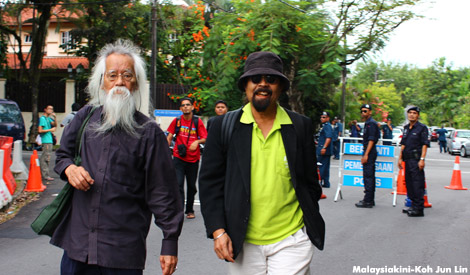
I am a rather open person. The police know where I live and what I do. To have the notion that you are being followed, it’s a waste of time for the state to follow me.
The ‘deep state’, I can understand how it identifies me. In the last 'Kita Lawan' (protest), I had lunch with some people and when I came out of the restaurant (in the Jalan Tuanku Abdul Rahman area), they detained me and sent me to Jinjang.
In front of the magistrate, the arresting officer said we were having a press conference (PC). The anak muda (youths) had a programme but I was not at the PC.
It’s like the last segment in Casablanca (the movie), after Ilsa flew out of Morocco. Captain Renault spoke to Rick and asked them to ‘round up the usual suspects’. They always need to round up the usual suspects. I am always on of the usual suspects.
I AM UPSET THAT THE STATE HAS CREATED ME AS BIGGER THAN WHAT I AM. I am just a routine person. The state has created me; it’s unnecessary. It has created people it wants to identify as ‘enemies of the state’.
In the last (sedition) trial, the judge said: “The guy has given a speech in the hall, but no one followed what he said.”
Yes, it is true I spoke at the May 13 meeting in 2013. They said it was seditious but nothing happened; everybody dispersed in peace.
IN 1998, I HAD NO CLUE WHO WAS BEHIND ‘REFORMASI’. I was there (at Jalan Tuanku Abdul Rahman, Kuala Lumpur) as an observer, on the way to Bagan Lalang to be a member of the jury for TV3 telemovie and film fest.
I was detained. Mahathir said “dalang reformasi telah ditangkap” (the mastermind of the reformasi movement has been detained).
I had just come back from Europe. It was convenient to connect me back to the history of 1974 (university student protests) to Anwar Ibrahim.
There is some truth (to the idea of Hishamuddin Rais as not just a construction of the state). There are certain historical events – 74 protest in Tasik Utara, 74 protest in Baling, activities in Australia and Europe; yes, it’s true. But that is my responsibility as a citizen. It’s a way of saying thank you to Malaysia.
I WAS BORN IN THIS COUNTRY. MY LOYALTY IS TO THIS PIECE OF LAND. This is my thank you - to uphold what is just and speak the truth.
If that is a crime, I suppose I am a criminal. If that is what the state construes me as criminal, then the state can identify me as a criminal.
I used to live in Baghdad in the late 70s. There’s a proverb – whoever drank water from the river Tigris – which separates old and new Baghdad – will always belong to Baghdad.
I LOOK FORWARD (to the nine months in jail), if they send me. I can have a break. I will stop writing, my column, my blog will be on hold. That’s it. I take a break.
Let’s see what happens after nine months. Now is a bad time, but good times are coming.
You know the story of Nabi Yusuf, where there was (the dream of seven skinny cows devouring seven fat cows, interpreted to mean) seven dry seasons to be followed by seven prosperous years? Now we are in the bad season but the good season will come.
Not tomorrow. The future is not the day after tomorrow. Next change. Akan datang. Change could be a long time coming.
MALAYSIANSKINI is a series on Malaysians you should know.
Previously featured:
Malaysian movie mania - Are viewers back for good?
Branded as 'deviant', Muslim scholar remains defiant
For Thasleem, life has indeed come a full circle
Poster girl for diversity? No thanks, says novelist Zen Cho
M’sian int’l hackathon champ shows computer games good for you
Pianist bears no grudge over concert cancellation due to Bersih 2
Facing possible jail time, Lena's main worry is dad finding out
This Malaysian youth has helped 10,000 Syrian families and counting

